- Home
- H. Rider Haggard
The Ghost Kings
The Ghost Kings Read online
Produced by Juliet Sutherland, S. R. Ellison and the OnlineDistributed Proofreading Team
THE GHOST KINGS
By H. Rider Haggard
First published _July_ 1908. _Reprinted March_ 1909.
Cheap Edition _December_ 1911.
CONTENTS
CHAPTER
1. THE GIRL
2. THE BOY
3. GOOD-BYE
4. ISHMAEL
5. NOIE
6. THE CASTING OF THE LOTS
7. THE MESSAGE OF THE KING
8. MR. DOVE VISITS ISHMAEL
9. THE TAKING OF NOIE
10. THE OMEN OF THE STAR
11. ISHMAEL VISITS THE Inkosazana
12. RACHEL SEES A VISION
13. RICHARD COMES
14. WHAT CHANCED AT RAMAH
15. RACHEL COMES HOME
16. THE THREE DAYS
17. RACHEL LOSES HER SPIRIT
18. THE CURSE OF THE Inkosazana
19. RACHEL FINDS HER SPIRIT
20. THE MOTHER OF THE TREES
21. THE CITY OF THE DEAD
22. IN THE SANCTUARY
23. THE DREAM IN THE NORTH
24. THE END AND THE BEGINNING
EXTRACT FROM LETTER HEADED "THE KING'S KRAAL, ZULULAND, 12TH MAY, 1855."
_"The Zulus about here have a strange story of a white girl who inDingaan's day was supposed to 'hold the spirit' of some legendary goddessof theirs who is also white. This girl, they say, was very beautiful andbrave, and had great power in the land before the battle of the BloodRiver, which they fought with the emigrant Boers. Her title was Lady ofthe Zulus, or more shortly, Zoola, which means Heaven.
"She seems to have been the daughter of a wandering, pioneer missionary,but the king, I mean Dingaan, murdered her parents, of whom he wasjealous, after which she went mad and cursed the nation, and it is to thiscurse that they still attribute the death of Dingaan, and their defeatsand other misfortunes of that time.
"Ultimately, it appears, in order to be rid of this girl and her evil eye,they sold her to the doctors of a dwarf people, who lived far away in aforest and worshipped trees, since when nothing more has been heard ofher. But according to them the curse stopped behind.
"If I can find out anything more of this curious story I will let youknow, but I doubt if I shall be able to do so. Although fifteen years orso have passed since Dingaan's death in 1840 the Kaffirs are very shy oftalking about this poor lady, and, I think, only did so to me because I amneither an official nor a missionary, but one whom they look upon as afriend because I have doctored so many of them. When I asked the Indunasabout her at first they pretended total ignorance, but on my pressing thequestion, one of them said that 'all that tale was unlucky and "wentbeyond" with Mopo.' Now Mopo, as I think I wrote to you, was the man whostabbed King Chaka, Dingaan's brother. He is supposed to have been mixedup in the death of Dingaan also, and to be dead himself. At any rate hevanished away after Panda came to the throne."_
CHAPTER I
THE GIRL
The afternoon was intensely, terribly hot. Looked at from the high groundwhere they were encamped above the river, the sea, a mile or two to herright--for this was the coast of Pondo-land--to little Rachel Dove staringat it with sad eyes, seemed an illimitable sheet of stagnant oil. Yetthere was no sun, for a grey haze hung like a veil beneath the arch of thesky, so dense and thick that its rays were cut off from the earth whichlay below silent and stifled. Tom, the Kaffir driver, had told her that astorm was coming, a father of storms, which would end the great drought.Therefore he had gone to a kloof in the mountains where the oxen were incharge of the other two native boys--since on this upland there was nopasturage to drive them back to the waggon. For, as he explained to her,in such tempests cattle are apt to take fright and rush away for miles,and without cattle their plight would be even worse than it was atpresent.
At least this was what Tom said, but Rachel, who had been brought up amongnatives and understood their mind, knew that his real reason was that hewished to be out of the way when the baby was buried. Kaffirs do not likedeath, unless it comes by the assegai in war, and Tom, a good creature,had been fond of that baby during its short little life. Well, it wasburied now; he had finished digging its resting-place in the hard soilbefore he went. Rachel, poor child, for she was but fifteen, had borne itto its last bed, and her father had unpacked his surplice from a box, putit on and read the Burial Service over the grave. Afterwards together theyhad filled in that dry, red earth, and rolled stones on to it, and asthere were few flowers at this season of the year, placed a shrivelledbranch or two of mimosa upon the stones--the best offering they had tomake.
Rachel and her father were the sole mourners at this funeral, if we mayomit two rock rabbits that sat upon a shelf of stone in a neighbouringcliff, and an old baboon which peered at these strange proceedings fromits crest, and finally pushed down a boulder before it departed, barkingindignantly. Her mother could not come because she was ill with grief andfever in a little tent by the waggon. When it was all over they returnedto her, and there had been a painful scene.
Mrs. Dove was lying on a bed made of the cartel, or frame strung withstrips of green hide, which had been removed from the waggon, a pretty,pale-faced woman with a profusion of fair hair. Rachel always rememberedthat scene. The hot tent with its flaps turned up to let in whatever airthere might be. Her mother in a blue dressing-gown, dingy with wear andtravel, from which one of the ribbon bows hung by a thread, her faceturned to the canvas and weeping silently. The gaunt form of her fatherwith his fanatical, saint-like face, pale beneath its tan, his highforehead over which fell one grizzled lock, his thin, set lips andfar-away grey eyes, taking off his surplice and folding it up with quickmovements of his nervous hands, and herself, a scared, wondering child,watching them both and longing to slip away to indulge her grief insolitude. It seemed an age before that surplice was folded, pushed into alinen bag which in their old home used to hold dirty clothes, and finallystowed away in a deal box with a broken hinge. At length it was done, andher father straightened himself with a sigh, and said in a voice thattried to be cheerful:
"Do not weep, Janey. Remember this is all for the best. The Lord hathtaken away, blessed be the name of the Lord."
Her mother sat up looking at him reproachfully with her blue eyes, andanswered in her soft Scotch accent:
"You said that to me before, John, when the other one went, down atGrahamstown, and I am tired of hearing it. Don't ask me to bless the Lordwhen He takes my babes, no, nor any mother, He Who could spare them if Hechose. Why should the Lord give me fever so that I could not nurse it, andmake a snake bite the cow so that it died? If the Lord's ways are such,then those of the savages are more merciful."
"Janey, Janey, do not blaspheme," her father had exclaimed. "You shouldrejoice that the child is in Heaven."
"Then do you rejoice and leave me to grieve. From to-day I only make oneprayer, that I may never have another. John," she added with a suddenoutburst, "it is your fault. You know well I told you how it would be. Itold you that if you would come this mad journey the babe would die, aye,and I tell you"--here her voice sank to a kind of wailing whisper--"beforethe tale is ended others will die too, all of us, except Rachel there, whowas born to live her life. Well, for my part, the sooner the better, for Iwish to go to sleep with my children."
"This is evil," broke in her husband, "evil and rebellious--"
"Then evil and rebellious let it be, John. But why am I evil if I have thesecond sight like my mother before me? Oh! she warned me what must come ifI married you, and I would not listen; now I warn you, and you will notlisten. Well, so be it, we must dree our own weird, everyone of us, ashort one; all save Rachel, who was born to live her life. Man, I t
ellyou, that the Spirit drives you on to convert the heathen just for onething, that the heathen may make a martyr of you."
"So let them," her father answered proudly. "I seek no better end."
"Aye," she moaned, sinking back upon the cartel, "so let them, but mybabe, my poor babe! Why should my babe die because too much religion hasmade you mad to win a martyr's crown? Martyrs should not marry and havechildren, John."
Then, unable to bear any more of it, Rachel had fled from the tent, andsat herself down at a distance to watch the oily sea.
It has been said that Rachel was only fifteen, but in Southern Africagirls grow quickly to womanhood; also her experiences had been of a natureto ripen her intelligence. Thus she was quite able to form a judgment ofher parents, their virtues and their weaknesses. Rachel was English born,but had no recollection of England since she came to South Africa when shewas four years old. It was shortly after her birth that thismissionary-fury seized upon her father as a result of some meetings whichhe had attended in London. He was then a clergyman with a good living in aquiet Hertfordshire parish, and possessed of some private means, butnothing would suit him short of abandoning all his prospects and sailingfor South Africa, in obedience to his "call." Rachel knew all this becauseher mother had often told her, adding that she and her people, who were ofa good Scotch family, had struggled against this South African scheme evento the verge of open quarrel.
At length, indeed, it came to a choice between submission and separation.Mr. Dove had declared that not even for her sake would he be guilty of"sin against the Spirit" which had chosen him to bring light to those whosat in darkness--that is, the Kaffirs, and especially to that section ofthem who were in bondage to the Boers. For at this time an agitation wasin progress in England which led ultimately to the freeing of the slavesof the Cape Dutch, and afterwards to the exodus of the latter into thewilderness and most of those wars with which our generation is familiar.So, as she was devoted to her husband, who, apart from his religiousenthusiasm, or rather possession, was in truth a very lovable man, shegave way and came. Before they sailed, however, the general gloom wasdarkened by Mrs. Dove announcing that something in her heart told her thatneither of them would ever see home again, as they were doomed to die atthe hands of savages.
Now whatever the reason or explanation, scientifically impossible as thefact might be, it remained a fact that Janey Dove, like her mother andseveral of her Scottish ancestors, was foresighted, or at least so herkith and kin believed. Therefore, when she communicated to them herconviction as though it were a piece of everyday intelligence, they neverdoubted its accuracy for a minute, but only redoubled their efforts toprevent her from going to Africa. Even her husband did not doubt it, butremarked irritably that it seemed a pity she could not sometimes beforesighted as to agreeable future events, since for his part he was quitewilling to wait for disagreeable ones until they happened. Not that hequailed personally from the prospect of martyrdom; this he couldcontemplate with complacency and even enthusiasm, but, zealot though hewas, he did shrink from the thought that his beautiful and delicate wifemight be called upon to share the glory of that crown. Indeed, as his ownpurpose was unalterable, he now himself suggested that he should go forthto seek it alone.
Then it was that his wife showed an unsuspected strength of character. Shesaid that she had married him for better or for worse against the wishesof her family; that she loved and respected him, and that she would ratherbe murdered by Kaffirs in due season than endure a separation which mightbe lifelong. So in the end the pair of them with their little daughterRachel departed in a sailing ship, and their friends and relations knewthem no more.
Their subsequent history up to the date of the opening of this story maybe told in very few words. As a missionary the Reverend John Dove was nota success. The Boers in the eastern part of the Cape Colony where helaboured, did not appreciate his efforts to Christianise their slaves. Theslaves did not appreciate them either, inasmuch as, saint though he mightbe, he quite lacked the sympathetic insight which would enable him tounderstand that a native with thousands of generations of savagery behindhim is a different being from a highly educated Christian, and one whoshould be judged by another law. Their sins, amongst which he included alltheir most cherished inherited customs, appalled him, as he continuallyproclaimed from the housetops. Moreover, when occasionally he did snatch abrand from the burning, and the said brand subsequently proved that it wasstill alight, or worse still, replaced its original failings by those ofthe white man, such as drink, theft and lying, whereof before it had beeninnocent, he would openly condemn it to eternal punishment. Further, hewas too insubordinate, or, as he called it, too honest, to submit to theauthority of his local superiors in the Church, and therefore would onlywork for his own hand. Finally he caused his "cup to overflow," as hedescribed it, or, in plain English, made the country too hot to hold him,by becoming involved in a bitter quarrel with the Boers. Of these, on thewhole, worthy folk, he formed the worst; and in the main a very unjustopinion, which he sent to England to be reprinted in Church papers, or tothe Home Government to be published in Blue-books. In due course thesedocuments reached South Africa again, where they were translated intoDutch and became incidentally one of the causes of the Great Trek.
The Boers were furious and threatened to shoot him as a slanderer. TheEnglish authorities were also furious, and requested him to cease fromcontroversy or to leave the country. At last, stubborn as he might be,circumstances proved too much for him, and as his conscience would notallow him to be silent, Mr. Dove chose the latter alternative. The onlyquestion was whither he should go. As he was well off, having inherited amoderate fortune in addition to what he had before he left England, hispoor wife pleaded with him to return home, pointing out that there hewould be able to lay his case before the British public. This course hadattractions for him, but after a night's reflection and prayer, herejected it as a specious temptation sent by Satan.
What, he argued, should he return to live in luxury in England not onlyunmartyred but a palpable failure, his mission quite unfulfilled? His wifemight go if she liked, and take their surviving children, Rachel and thenew-born baby boy, with her (they had buried two other little girls), buthe would stick to his post and his duty. He had seen some Englishmen whohad visited the country called Natal where white people were beginning tosettle. In that land it seemed there were no slave-driving Boers, and thenatives, according to all accounts, much needed the guidance of theGospel, especially a certain king of the people called Zulus, who wasnamed Chaka or Dingaan, he was not sure which. This ferocious person heparticularly desired to encounter, having little doubt that in the absenceof the contaminating Boer, he would be able to induce him to see the errorof his ways and change the national customs, especially those of fightingand, worse still, of polygamy.
His unhappy wife listened and wept, for now the martyr's crown which shehad always foreseen, seemed uncomfortably near, indeed as it were, itglowed blood red within reach of her hand. Moreover, in her heart she didnot believe that Kaffirs could be converted, at any rate at present. Theywere fighting men, as her Highland forefathers had been, and her Scottishblood could understand the weakness, while, as for this polygamy, she hadlong ago secretly concluded that the practice was one which suited themvery well, as it had suited David and Solomon, and even Abraham. But forall this, although she was sure in her uncanny fashion that her baby'sdeath would come of her staying, she refused to leave her husband as shehad refused eleven years before.
Doubtless affection was at the bottom of it, for Janey Dove was a veryfaithful woman; also there were other things--her fatalism, and strongerstill, her weariness. She believed that they were doomed. Well, let thedoom fall; she had no fear of the Beyond. At the best it might be happy,and at the worst deep, everlasting rest and peace, and she felt as thoughshe needed thousands of years of rest and peace. Moreover, she was sure noharm would come to Rachel, the very apple of her eye; that she was markedto live and to find happin
ess even in this wild land. So it came aboutthat she refused her husband's offer to allow her to return home where shehad no longer any ties, and for perhaps the twentieth time preparedherself to journey she knew not whither.
Rachel, seated there in the sunless, sweltering heat, reflected on thesethings. Of course she did not know all the story, but most of it had comeunder her observation in one way or other, and being shrewd by nature, shecould guess the rest, for she who was companionless had much time forreflection and for guessing. She sympathised with her father in his ideas,understanding vaguely that there was something large and noble about them,but in the main, body and mind, she was her mother's child. Already sheshowed her mother's dreamy beauty, to which were added her father'sstraight features and clear grey eyes, together with a promise of hisheight. But of his character she had little, that is outside of a courageand fixity of purpose which marked them both.
For the rest she was far, or fore-seeing, like her mother, apprehendingthe end of things by some strange instinct; also very faithful incharacter.
Rachel was unhappy. She did not mind the hardship and the heat, for shewas accustomed to both, and her health was so perfect that it would haveneeded much worse things to affect her. But she loved the baby that wasgone, and wondered whether she would ever see it again. On the whole shethought so, for here that intuition of hers came in, but at the best shewas sure that there would be long to wait. She loved her mother also, andgrieved more for her than for herself, especially now when she was so ill.Moreover, she knew and shared her mind. This journey, she felt, wasfoolishness; her father was a man "led by a star" as the natives say, andwould follow it over the edge of the world and be no nearer. He was notfit to have charge of her mother.
Of herself she did not think so much. Still, at Grahamstown, for a year orso there had been other children for companions, Dutch most of them, it istrue, and all rough in mind and manner. Yet they were white and human.While she played with them she could forget she knew so much more thanthey did; that, for instance, she could read the Gospels in Greek--whichher father had taught her ever since she was a little child--while theycould scarcely spell them out in the Taal, or Boer dialect, and that theyhad never heard even of William the Conqueror. She did not careparticularly about Greek and William the Conqueror, but she did care forfriends, and now they were all gone from her, gone like the baby, as faroff as William the Conqueror. And she, she was alone in the wildernesswith a father who talked and thought of Heaven all day long, and a motherwho lived in memories and walked in the shadow of doom, and oh! she wasunhappy.
Her grey eyes filled with tears so that she could no longer see thateverlasting ocean, which she did not regret as it wearied her. She wipedthem with the back of her hand that was burnt quite brown by the sun, andturning impatiently, fell to watching two of those strange insects knownas the Praying Mantis, or often in South Africa as Hottentot gods, whichafter a series of genuflections, were now fighting desperately among thedead stalks of grass at her feet. Men could not be more savage, shereflected, for really their ferocity was hideous. Then a great tear fellupon the head of one of them, and astonished by this phenomenon, orthinking perhaps that it had begun to rain, it ran away and hid itself,while its adversary sat up and looked about it triumphantly, taking toitself all the credit of conquest.
She heard a step behind her, and having again furtively wiped her eyeswith her hand, the only handkerchief available, looked round to see herfather stalking towards her.
"Why are you crying, Rachel?" he asked in an irritable voice. "It is wrongto cry because your little brother has been taken to glory."
"Jesus cried over Lazarus, and He wasn't even His brother," she answeredin a reflective voice, then by way of defending herself addedinconsequently: "I was watching two Hottentot gods fight."
As Mr. Dove could think of no reply to her very final Scriptural example,he attacked her on the latter point.
"A cruel amusement," he said, "especially as I have heard that boys, yes,and men, too, pit these poor insects against each other, and make betsupon them."
"Nature, is cruel, not I father. Nature is always cruel," and she glancedtowards the little grave under the rock. Then, while for the second timeher father hesitated, not knowing what to answer, she added quickly, "Ismother better now?"
"No," he said, "worse, I think, very hysterical and quite unable to seethings in the true light."
She rose and faced him, for she was a courageous child, then asked:
"Father, why don't you take her back? She isn't fit to go on. It is wrongto drag her into this wilderness."
At this question he grew very angry, and began to scold and to talk of thewickedness of abandoning his "call."
"But mother has not got a 'call,'" she broke in.
Then, as for the third time he could find no answer, he declaredvehemently that they were both in league against him, instruments used bythe Evil One to tempt him from his duty by working on his natural fearsand affections, and so forth.
The child watched him with her clear grey eyes, saying nothing further,till at last he grew calm and paused.
"We are all much upset," he went on, rubbing his high forehead with histhin hand. "I suppose it is the heat and this--this--trial of our faith.What did I come to speak to you about? Oh! I remember; your mother willeat nothing, and keeps asking for fruit. Do you know where there is anyfruit?"
"It doesn't grow here, father." Then her face brightened, and she added:"Yes, it does, though. The day that we outspanned in this camp mother andI went down to the river and walked to that kind of island beyond the drydonga to get some flowers that grow on the wet ground. I saw lots of Capegooseberries there, all quite ripe."
"Then go and get some, dear. You will have plenty of time before dark."
She started up as though to obey, then checked herself and said:
"Mother told me that I was not to go to the river alone, because we sawthe spoor of lions and crocodiles in the mud."
"God will guard you from the lions and the crocodiles, if there are any,"he answered doggedly, for was not this an opportunity to show his faith?"You are not afraid, are you?"
"No, father. I am afraid of nothing, perhaps because I don't care whathappens. I will get the basket and go at once."
In another minute she was walking quickly towards the river, a lonelylittle figure in that great place. Mr. Dove watched her uneasily till shewas hidden in the haze, for his reason told him that this was a foolishjourney.
"The Lord will send His angels to protect her," he muttered to himself."Oh! if only I could have more faith, all these troubles come upon me froma lack of faith, and through that I am continually tempted. I think I willrun after her and go, too. No, there is Janey calling me, I cannot leaveher alone. The Lord will protect her, but I need not mention to Janey thatshe has gone, unless she asks me outright. She will be quite safe, thestorm will not break to-night."

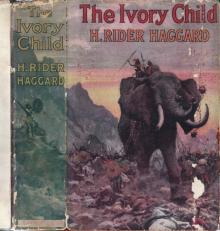 The Ivory Child
The Ivory Child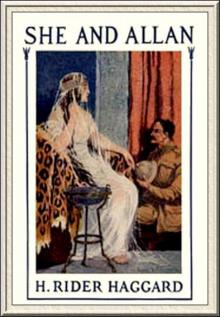 She and Allan
She and Allan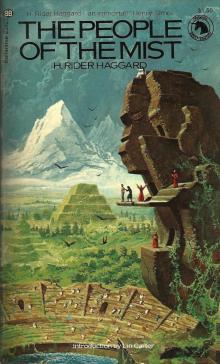 The People of the Mist
The People of the Mist She
She Morning Star
Morning Star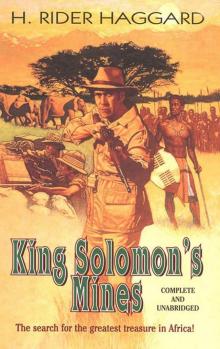 King Solomon's Mines
King Solomon's Mines She: A History of Adventure
She: A History of Adventure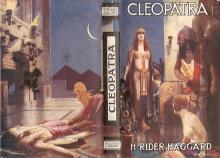 Cleopatra
Cleopatra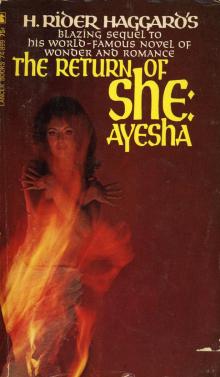 Ayesha, the Return of She
Ayesha, the Return of She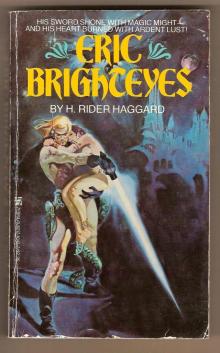 Eric Brighteyes
Eric Brighteyes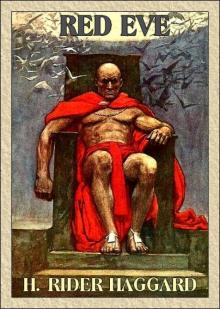 Red Eve
Red Eve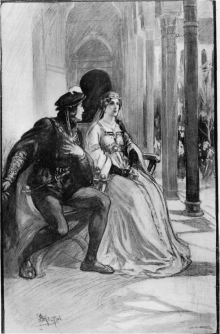 Fair Margaret
Fair Margaret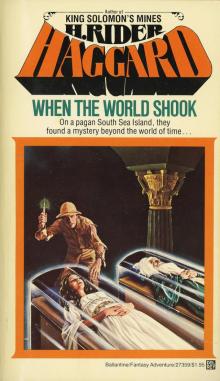 When the World Shook
When the World Shook Lysbeth, a Tale of the Dutch
Lysbeth, a Tale of the Dutch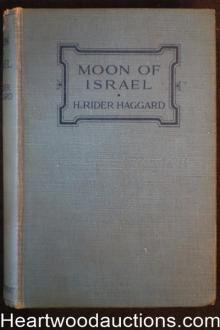 Moon of Israel: A Tale of the Exodus
Moon of Israel: A Tale of the Exodus Long Odds
Long Odds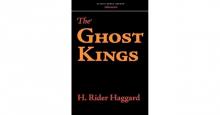 The Ghost Kings
The Ghost Kings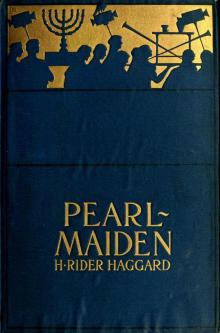 Pearl-Maiden: A Tale of the Fall of Jerusalem
Pearl-Maiden: A Tale of the Fall of Jerusalem Allan and the Holy Flower
Allan and the Holy Flower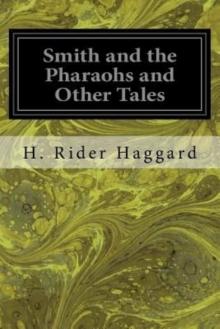 Smith and the Pharaohs, and other Tales
Smith and the Pharaohs, and other Tales The Wanderer's Necklace
The Wanderer's Necklace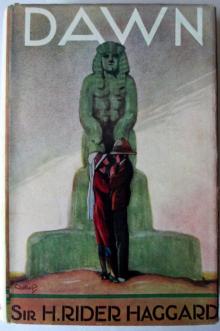 Dawn
Dawn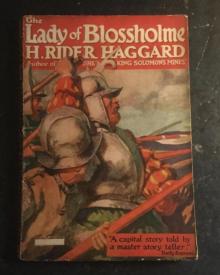 The Lady of Blossholme
The Lady of Blossholme Stella Fregelius: A Tale of Three Destinies
Stella Fregelius: A Tale of Three Destinies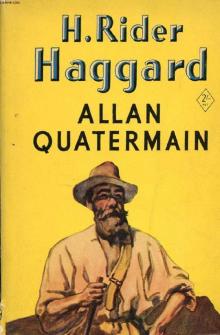 Allan Quatermain
Allan Quatermain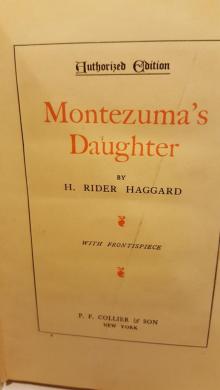 Montezuma's Daughter
Montezuma's Daughter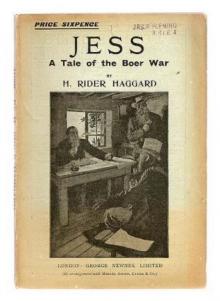 Jess
Jess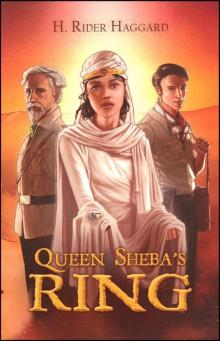 The Brethren
The Brethren Allan's Wife
Allan's Wife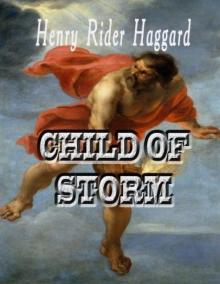 Child of Storm
Child of Storm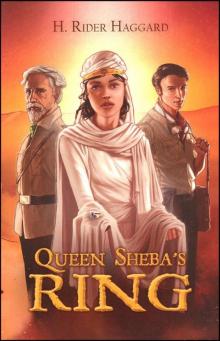 Queen Sheba's Ring
Queen Sheba's Ring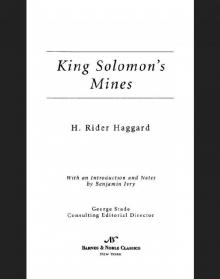 King Solomon's Mines (Barnes & Noble Classics Series)
King Solomon's Mines (Barnes & Noble Classics Series)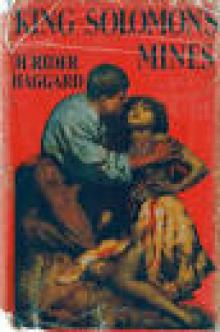 Complete Allan Quatermain Omnibus - Volumes 1 - 10
Complete Allan Quatermain Omnibus - Volumes 1 - 10